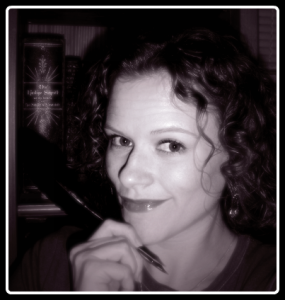
Courtney Cantrell's weekly writing advice.
Cormac McCarthy is one of my new favorite authors, because he uses words like “chary” and “excelsior.”
Off the top of my head, I’m not even sure anymore what those words mean. I looked them up when I first read them; but, as my English teacher friend Pam says, you gotta experience a new word in ten different contexts before it becomes part of your vocabulary. So I think I have 7.5 experiences to go for chary, and 8.5 for excelsior. Give or take a few tenths of a point. At any rate, whatever their meanings, those two are lovely-sounding words, and I invite you to seek and find them in the dictionary nearest you.
Pure and Simple
As I read McCarthy’s The Road, I just had to drop my jaw at how the man uses words. Lest this article transmogrify into nothing more than a McCarthy-rave, let me just say: READ THIS
! McCarthy is a master of vivid detail and excellent characterization in a minimalist style. Talk about stripping your prose — McCarthy even does away with quotation marks and apostrophes, which I’m sure has all you purists out there howling with indignation. (I whimpered a bit at first, myself.) Still–if you’re looking for fiction trimmed of all fat and frills, I doubt you’ll find a leaner example than McCarthy’s bleak post-apocalypse.
Don’t worry. I am not digressing, as I am so oft wont to do. McCarthy’s minimalism is the staff paper on which he composes the sheer elegance that grips me so. His every sentence draws your mind and your heart on to the next–a cadence of lovely words arranged in perfect chord structure. When you pick apart his melody, you find individual notes beautiful in and of themselves:
intestate
shrunken
ensepulchred
davits
sludge
swag
loess
torsional
vermiculate
Don’t those just sound cool?!?
Pure and Simple?
Unusual words, like the ones above, are like chocolate to me. Sweet. Rich. Satisfying. But I recognize that even I, chocoholic that I am, do not benefit from overindulgence. McCarthy enthralls us with a word melody as smooth and delectable as chocolate–but he is a master story composer. Not every writer has yet learned how to combine those exotic words in such a way as to bring forth elegance. Some of us are ready to put notes to paper. Some of us are making our first cautious forays into simple word melodies. Some of us are still whamming away at a snare drum with a stick and thinking it sounds like Neal Peart. To make it a practical point: It sounds a lot better for me to say “cut the crap” than it does for me to advise you to “eschew obfuscation.” If I were a Cormac McCarthy, maybe I’d have the clout to eschew, but I’m not there yet.
Those chocolatey, outlandish words sound lovely–but if we writers don’t know how to use them, or if our readers just don’t know them, our writing is going to sound garish at best, dissonant at worst. I don’t know, maybe some of you are going for avante-garde dissonance; if so, I wish you all the modern, abstract best. For the rest of us, if we’re going to write stories that taste and sound good to our readers’ hearts, we’re gonna have to spend time reading at the feet of the masters. We need to spend hours upon days in the practice room, tweaking our word melodies and experimenting with sentence composition. We have the freedom and skill to play with the music of our writing–and we have the obligation to do so. It’s the only way we’ll learn first to imitate our masters, then equal them, and, finally, surpass them.
Purity. Simplicity.
In The Road, McCarthy uses two other words I particularly enjoy listening to: “illucid,” which I think he made up; and “crozzled,” which seems to be a term from northeastern American dialects. He not only composes beautiful sentences, he even invents words to fit his own cadences. I can’t give you the definitions of illucid and crozzled. But I can invite you to listen to them. Say them to yourself in your head. Speak them aloud so you can taste them. Illucid is smooth on the tongue; crozzled might be a piece of dark chocolate with nuts in it. You don’t need to hear the definitions. Just hear the words themselves, and you’ll know what they mean.
The ability to make that kind of word music happen–that’s the kind of mastery I want.
And that’s WILAWriTWe.
(If you click any of the above links, they’ll take you to Amazon. If you purchase any product in the same browser session, you’ll be helping me buy more chocolate. Just sayin’.)
Photo credit Courtney Cantrell.





